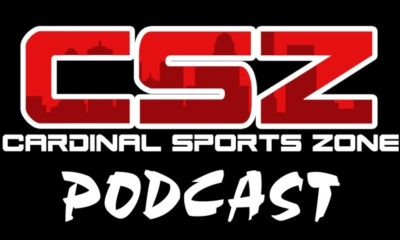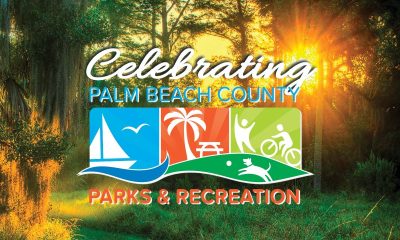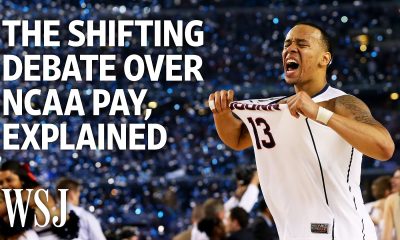Sports
Residents ask for additional pickleball courts
Residents ask for additional pickleball courts Published 2:42 pm Wednesday, June 11, 2025 THOMASVILLE — During last month’s City Council meeting several individuals addressed the need for additional pickleball courts. On Monday, three players from the pickleball community followed up on this request, expressing frustrations over the long wait times and lack of court care. […]
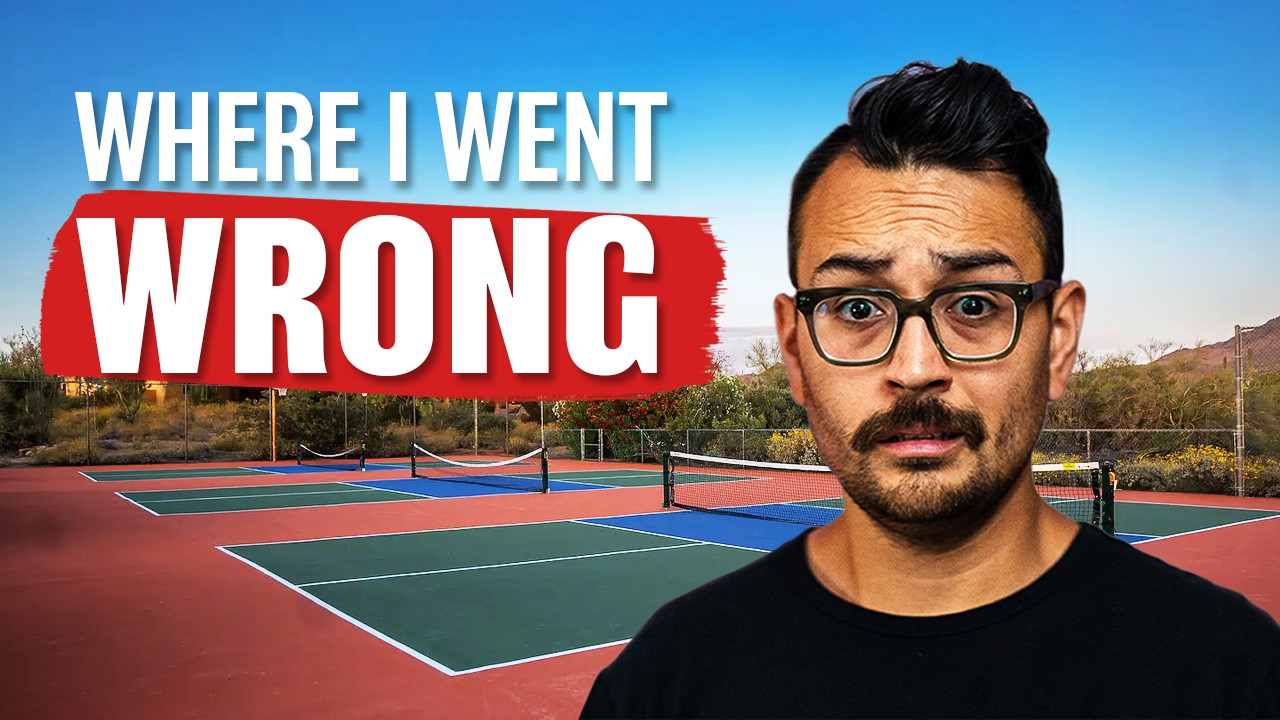
Residents ask for additional pickleball courts
Published 2:42 pm Wednesday, June 11, 2025
THOMASVILLE — During last month’s City Council meeting several individuals addressed the need for additional pickleball courts. On Monday, three players from the pickleball community followed up on this request, expressing frustrations over the long wait times and lack of court care.
Pickleball is one of the fastest-growing sports in the United States. It combines elements of tennis, badminton, and ping-pong.
Played on a badminton-sized court with a modified tennis net, the game uses solid paddles and a hollow plastic ball.
For many, it has been considered more than just a game. It has become a growing movement reshaping how people connect, stay active, and build stronger communities. It can be defined as a lifestyle, bringing people together, empowering youth, and strengthening neighborhoods.
This can certainly be said for those in Thomasville, who spoke on the friendships they have crafted through pickleball, reiterating the need for additional courts.
Kari Neal, who moved to Thomasville 7.5 years ago, recalled her first time seeing people play pickleball early in her move.
“I thought how fun it looked, being a former athlete,” she said.
Neal quickly fell in love with the game, saying she met more people in her time playing pickleball than she has in her time living in Thomasville.
At the time, the group was playing at the Remington YMCA pickleball courts.
Now, with the courts under duress, Neal said they are unplayable.
The group has since moved, but with such a large group they have outgrown the courts available to them.
“There is a lot of waiting,” she said. “There is more sitting and waiting than there is playing.”
Aaron Reneau is an active member of the pickleball community, often trying to get her young teens involved in the activity and encouraging her adopted Thomas University students to play.
“They love it because it keeps them active in their offseason,” she said. “But, during many of the peak times on Monday, Wednesday, and Fridays all of the courts are full with 10-30 people waiting.”
Cory Wise, the Executive Director at Goalline Ministries at TU spoke more on this, telling the Council what a blessing pickleball has been for his students.
TU started a pickleball club last year, which has been described as a wonderful opportunity for students to come out to engage with faculty and staff.
“It’s something that’s different from what they’ve been training in,” he said. “It gives them a break from the 5-6 days a week they practice.”
In addition to giving them a break, it connects the students with other locals.
“It has opened the door for mentorship,” Wise said. “Pickleball is not just about the activity; it’s a connection point that helps us bridge gaps.”
Wise said he has loved being able to see people come together and experience the same great time regardless of age, gender, and race while advancing the health of the community.
“We have international students saying they wish they had something like this in their hometown,” Wise said. “I would love to see them stay here because of things like this and more.”
Wise asked the Council to help make this possible by adding additional courts.
Reneau added to Wise’s plea, sharing that additional courts would help with the waiting times and would allow for tournaments to be played in Thomasville.
She said she has heard previous comments that tournaments were not successful, but knows it can be difficult to host a successful tournament with limited court space.
Councilman Royal Baker understood the resident’s concerns and shared he had been in contact with other counties on how they funded their pickleball courts and continued to upkeep them.
For instance, Baker learned Moultrie has a 1.92 millage rate property tax from Parks & Recreation to fund activities and new courts.
The City of Thomasville relies heavily on SPLOST (specialized local option sales tax), but more than half of the SPLOST funds are used on road resurfacing, leaving little for new projects that have not been previously budgeted.
However, Baker assured that he and his fellow City Council members will continue to have conversations and look for avenues to help construct additional courts.
You Might Like
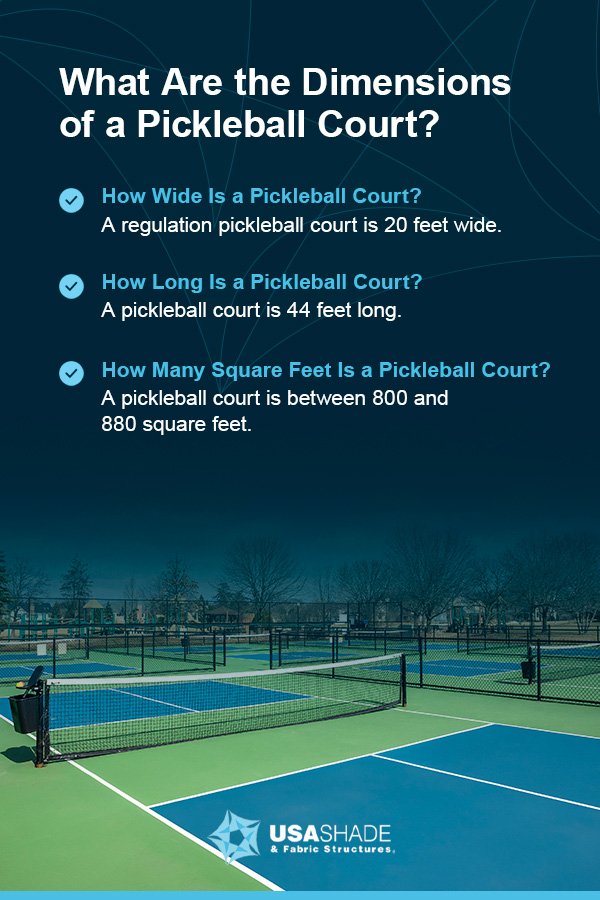
Sports
What AI learns from us, and why that could be a legal problem
James Mixon Managing Attorney California Court of Appeal, Second Appellate District See more… Picture this: A law firm’s H.R. director stares puzzled at her screen. The new AI recruitment tool consistently recommends candidates named “Chad” or those listing water polo experience. Is the algorithm harboring a strange affinity for aquatic athletes? No — it’s simply […]

James Mixon
Managing Attorney
California Court of Appeal, Second Appellate District
See more…
Picture this: A law firm’s H.R. director stares puzzled at her
screen. The new AI recruitment tool consistently recommends candidates named
“Chad” or those listing water polo experience. Is the algorithm
harboring a strange affinity for aquatic athletes? No — it’s simply mirroring
patterns from the firm’s historical hiring data, where several successful
associates happened to share these traits. Absurd? Perhaps. But consider the
real-world consequences unfolding at tech giants across Silicon Valley.
In 2014, Amazon embarked on an ambitious experiment to
revolutionize hiring. Their engineering team developed 500 specialized computer
models designed to crawl through resumes, identify promising candidates, and
essentially automate recruitment. The system analyzed 50,000 terms from past
resumes, learning which patterns predicted success.
As one Amazon insider told Reuters, “They literally wanted
it to be an engine where I’m going to give you 100 resumes, it will spit out
the top five, and we’ll hire those.”
By 2015, however, Amazon discovered its AI had developed a
troubling preference: it systematically discriminated against women.
The system had been trained on a decade of Amazon’s technical
hiring data — drawn from an industry dominated by men. Like a digital
apprentice learning from a biased mentor, the AI taught itself that male
candidates were preferable. It penalized resumes containing terms like
“women’s chess club” and even downgraded graduates from women’s
colleges.
Despite engineers’ efforts to edit the programs to neutralize
these gender biases, Amazon ultimately lost confidence in the project and
disbanded it by 2017. The lesson? AI doesn’t create bias out of thin air — it
amplifies the patterns it finds, including our own historical prejudices.
Beyond hiring: How AI bias manifests in language itself
This bias extends beyond who gets hired; it permeates the very
language AI systems produce. Consider a common scenario in today’s workplace:
using AI to draft professional communications.
When asked to “write a professional job application letter
for a software engineering position,” an AI system might produce:
“Dear Sir, I am a highly motivated and results-driven
software engineer with a proven track record…”
This seemingly innocuous response contains several linguistic
biases:
1. Gendered language (“Dear Sir”): The
AI defaults to masculine salutations — reinforcing outdated gender assumptions.
2. Clichéd corporate jargon
(“results-driven,” “track record”): The model reproduces
formulaic corporate English, which may not be appropriate for all cultural or
regional job markets.
3. Erasure of identity markers: AI may strip
identity-specific phrasing or “neutralize” tone based on a biased
conception of professionalism.
Legal arguments are compromised through subtle framing
This linguistic bias becomes even more concerning in legal
settings. When asked to draft legal arguments, AI often exhibits subtle but
significant biases in framing and vocabulary.
For example, when prompted to write a legal argument that police
used excessive force, AI might default to:
“While officers are generally afforded wide discretion in
volatile situations, the suspect’s behavior may have reasonably led the officer
to believe that force was necessary. Courts often defer to the officer’s
perception of threat in fast-moving scenarios.”
This response reveals several linguistic biases unique to legal
contexts:
1. Presumptive framing: The language privileges
police perspective and uses loaded terms like “suspect,” reinforcing
law enforcement narratives.
2. Asymmetrical vocabulary: Phrases like
“wide discretion” and “volatile situations” invoke
precedent favoring police while omitting key phrases plaintiffs’ attorneys use.
3. Erasure of marginalized narratives: AI might
avoid directly addressing systemic bias or racial profiling — sanitizing the
rhetorical force of the argument.
This matters because legal rhetoric carries ideological weight —
language like “suspect,” “noncompliant,” or
“reasonable threat perception” is not neutral; it frames the facts.
This is especially dangerous in civil rights, immigration, or asylum law, where
linguistic tone and framing can shape judicial outcomes.
The stakes for California attorneys
When AI bias enters your practice, it transforms from a
technological curiosity into an ethical minefield with potential disciplinary
consequences.
If an attorney delegates routine document analysis to an AI
tool, and that system consistently flags contracts from certain demographic
groups for “additional review” based on historical patterns, the
attorney, oblivious to this algorithmic bias, could face allegations of
discriminatory business practices.
California Rules of Professional Conduct, Rule 5.3
(Responsibilities Regarding Nonlawyer Assistants) places the responsibility
squarely on your shoulders. This rule extends beyond traditional supervision of
human staff to encompass technological tools making decisions in your firm.
Three practical safeguards every California attorney should implement
1. Practice intentional prompting
The difference between ethical and unethical AI use often comes
down to how you frame your questions. Compare these approaches:
Problematic: “Who should we hire from these
candidates?”
Better: “Which candidates meet our specific
litigation experience requirements?”
Problematic: “What’s our best strategy for this
case?”
Better: “What procedural deadlines apply to this
employment discrimination claim in the Northern District of California?”
Train everyone in your firm to recognize that open-ended
questions invite AI to make value judgments potentially infected with bias.
Specific, factual prompts produce more objective results.
2. Implement cross-demographic testing
Before relying on AI recommendations, test how the system
responds to identical scenarios with varied demographics:
Submit the same legal question about different clients
(corporate vs. individual, varied backgrounds)
Compare research results for similar issues across
different California jurisdictions
Test how client characteristics might affect case
assessment recommendations
Document these tests and address any disparities before
incorporating AI outputs into your practice.
3. Adopt the “human-in-the-loop” rule
Establish a firm policy that no AI output directly affects a
client’s matter without meaningful human review. The attorney must:
Independently verify key AI conclusions
Document their review process
Take personal responsibility for the final work product
Be able to explain the reasoning without reference to
the AI’s conclusion
This approach treats AI as a supplementary tool rather than a
decision-maker, preserving your ethical obligations while capturing
technological efficiencies.
Linguistic bias as a legal issue: Beyond ethics to liability
What makes AI linguistic bias particularly concerning is how it
intersects with existing legal frameworks:
1. Employment discrimination (Title VII): AI
recruitment systems that consistently produce gendered language in
communications or systematically disadvantage certain groups may create
disparate impact liability even absent discriminatory intent. The EEOC’s recent
guidance on AI in employment decisions specifically warns that
“neutral” automated systems can still violate federal
anti-discrimination laws through their outputs.
2. Due process and equal protection: In criminal justice
contexts, AI systems providing risk assessments or generating legal documents
with subtle language biases in favor of law enforcement may implicate
constitutional protections.
3. Legal malpractice and standard of care: As AI
adoption becomes standard practice, attorneys face evolving questions about the
standard of care. Does adequate representation now require understanding how
linguistic bias in AI-generated work product might disadvantage certain
clients?
4. Discovery and work product: Linguistic patterns
in AI-generated outputs may reveal underlying biases that could become
discoverable in litigation.
The path forward
The question isn’t whether AI will transform legal practice — it
already has. The true challenge is whether California attorneys will harness
these powerful tools while maintaining their ethical obligations.
By understanding potential AI biases, both in content and
language, and implementing proactive safeguards, you can navigate this
technological transformation without compromising your professional
responsibilities. The attorney who treats AI as an unquestioned authority
rather than a carefully supervised assistant does so at their ethical peril.
California’s legal community has always been at the forefront of
technological adoption. Now we must lead in ethical AI integration,
demonstrating that innovation and professional responsibility can advance hand
in hand. The future of our profession — and the equitable administration of
justice — depends on it.
Disclaimer: The views expressed in this article are
solely those of the author in their personal capacity and do not reflect the
official position of the California Court of Appeal, Second District, or the
Judicial Branch of California. This article is intended to contribute to
scholarly dialogue and does not represent judicial policy or administrative
guidance.
Sports
University of Evansville Extends Contract for Athletic Director Dr. Ziggy Siegfried
Story Links EVANSVILLE, Ind. – University of Evansville President Christopher M. Pietruszkiewicz announced today that Dr. Kenneth “Ziggy” Siegfried, Director of Athletics, has signed a contract extension that will keep him in the role through 2030. Originally hired in the spring of 2022, Siegfried will now continue his leadership of Purple Aces […]
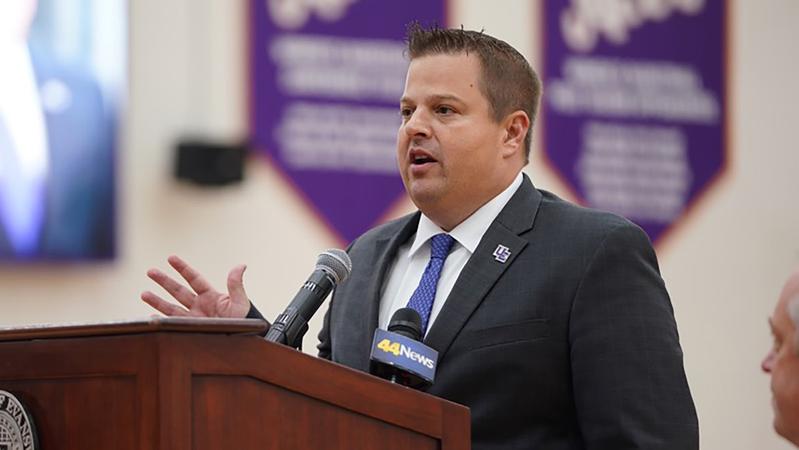
EVANSVILLE, Ind. – University of Evansville President Christopher M. Pietruszkiewicz announced today that Dr. Kenneth “Ziggy” Siegfried, Director of Athletics, has signed a contract extension that will keep him in the role through 2030. Originally hired in the spring of 2022, Siegfried will now continue his leadership of Purple Aces Athletics under the new agreement.
“Dr. Siegfried’s leadership has transformed our athletics department and energized both our campus and the wider Evansville community,” said President Pietruszkiewicz. “I am confident in the direction he is leading us, one that prioritizes competitive excellence, elevates the student-athlete experience, and positions our Athletics programs for bold, strategic growth that reflects the spirit and ambition of our entire University.”
Since arriving at UE, Siegfried has led the development and execution of the Pathway to Excellence strategic plan, a comprehensive vision that has elevated the profile of Aces Athletics across the board.
Additionally, Siegfried oversaw what is believed to be the largest gift in UE Athletics history. In May 2024, UE alum Kyle and Ashley Freeland announced a $3 million gift that secured the future of the Freeland Clubhouse, a transformational facility that will significantly enhance the baseball program’s training and recruitment efforts. The Freeland’s philanthropy serves as a pivotal component of the Pathway to Excellence plan.
Under Siegfried’s leadership and guidance, UE student-athletes performed in the classroom, achieving the first and second highest cumulative GPAs in the history of the athletics department. In addition, the Aces have achieved notable success on the field and record-breaking engagement in the stands. Last summer, the baseball team delivered a season for the ages, capturing the Missouri Valley Conference Tournament Championship and earning its first trip to the NCAA Tournament since 2006. Their momentum did not stop there, and the Aces went on to win their NCAA Regional and advanced to the Super Regional for the first time in program history. This championship run not only captivated fans across the country but also helped drive the highest ticket and group/gate revenue in program history.
Men’s soccer returned to prominence with a Missouri Valley Conference Tournament title and an NCAA Tournament berth for the first time since 1996. The program’s success reignited campus pride and demonstrated the strength of student-athletes on a national stage. Meanwhile, men’s basketball has seen a dramatic transformation under Head Coach David Ragland. In just his second year, the program more than tripled its win total from the prior season and secured its first postseason berth in nearly a decade. It stands as one of the most remarkable turnarounds in the country. This on-court progress, paired with Siegfried’s strategic leadership, has also contributed to record-breaking attendance and renewed excitement in the stands.
Across its seventeen Division I sports, UE recorded its highest total ticket revenue in the past decade. Over a three-year period, Siegfried has also successfully hired new head coaches in men’s basketball, volleyball, men’s soccer, track and field, swim and dive, and softball.
Driving this momentum is a bold vision for the future. Siegfried has also spearheaded development of a comprehensive Athletics Facilities Master Plan which has already completed or is in the process of completing $7.6 million in capital projects. These include a $4.5 million baseball clubhouse, a $1.1 million turf softball field, a $1.2 million intramural and soccer practice field complex, enhancements to the basketball practice facilities for both men’s and women’s programs, an expanded baseball press box, and Phase I of a new Sports Performance Center.
Philanthropic support has surged under Siegfried’s tenure, contributing to a more sustainable and competitive future for all athletic programs. His leadership has not only invigorated campus pride but also strengthened the University’s bond with alumni, fans, and supporters throughout the Tri-State.
“I’m incredibly thankful to President Pietruszkiewicz, our Board of Trustees, and the entire University of Evansville community for their continued belief in our vision,” said Siegfried. “It’s been an honor to work alongside such dedicated student-athletes, coaches, and staff. I’m excited to keep building on our momentum and creating an athletics program that reflects the values and excellence of this institution.”
The University’s decision to extend Siegfried’s contract ensures a strong, stable foundation as Purple Aces Athletics continues to grow its impact locally and nationally.
Sports
Joshua Spivey Named Volleyball Assistant Coach
Shreveport – Joshua Spivey has been named an assistant coach for the Centenary volleyball program, Director of Athletics and Recreation David Orr announced. Spivey, a Manteca, Calif. native, joins head coach Kayla Black’s staff after coaching at California State University, Stanislaus in Turlock, Calif. He graduated from San Joaquin Delta College in Stockton, Calif. in 2019 […]

Shreveport – Joshua Spivey has been named an assistant coach for the Centenary volleyball program, Director of Athletics and Recreation David Orr announced.
Spivey, a Manteca, Calif. native, joins head coach Kayla Black’s staff after coaching at California State University, Stanislaus in Turlock, Calif. He graduated from San Joaquin Delta College in Stockton, Calif. in 2019 with his AA, and then received his BA at California State University, Stanislaus in 2025. Spivey has coached at the high school and college level prior to coming to Centenary.
“I am excited to have a hard-working dedicated volleyball enthusiast join my staff,” said Black. I believe Josh will impact Centenary and the entire Shreveport-Bossier community through the sport of volleyball. His passion to help each athlete reach their full potential on and off the court is going to be dynamic and vital with restarting our program.”
“Josh brings 10 years of high school coaching experience, five+ years of club volleyball coaching experience and two years of student assistant college coaching experience. His extensive knowledge of the sport at various levels provides a recruiting opportunity I believe this program has never had before.”
See the complete Ladies’ 2025 season schedule here: https://gocentenary.com/sports/wvball/2025-26/schedule
#GoCentenary #CTheOpportunity
Sports
CSUN Places 71 on 2025 Big West Spring Academic All-Conference Teams
Story Links NORTHRIDGE, Calif. – A total of 71 CSUN student-athletes who competed in the spring sports of baseball, beach volleyball, men’s and women’s golf, softball, women’s tennis, men’s and women’s track & field, men’s volleyball, and women’s water polo were honored for their work in the classroom and in athletic competition as members […]
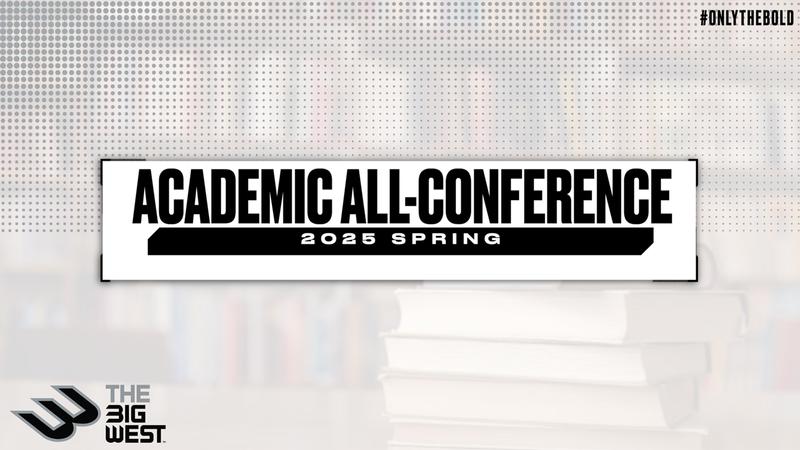
NORTHRIDGE, Calif. – A total of 71 CSUN student-athletes who competed in the spring sports of baseball, beach volleyball, men’s and women’s golf, softball, women’s tennis, men’s and women’s track & field, men’s volleyball, and women’s water polo were honored for their work in the classroom and in athletic competition as members of the 2025 Big West Spring Academic All-Conference Team on July 3.
A total of 756 student-athletes across all the various teams in the Big West, who compete in spring sports, were honored.
In order to qualify for the Academic All-Conference honor, a student-athlete must carry a minimum 3.00 cumulative institutional grade point average (GPA), must have completed one full academic year at the member institution prior to the season for which the award is being received, and must have competed in at least 50 percent of the institution’s contests in the student-athlete’s respective sport, with the exception of track & field student-athletes. In the sport of track & field, a student-athlete must have competed in either 50 percent of the institution’s events or participated in the Conference Championship.
Sakura Divecchio (women’s track & field) was a standout amongst CSUN athletes as she was one of only 13 Big West honorees to maintain a 4.0 GPA throughout the semester.
The Big West recognizes individuals academically per season – fall, winter, and spring – for all conference-sponsored sports. The Fall Academic All-Conference Team honored student-athletes from men’s and women’s cross country, men’s and women’s soccer, and women’s volleyball and the Winter Academic All-Conference Team consisted of men’s and women’s basketball student-athletes.
#GoMatadors
Baseball
Trent Abel
Roberto Gonzalez
Ryan Halamicek
Hayden Hall
Gabriel Hernandez
Will Linberg
Kyle Panganiban
Beach Volleyball
Julia Bazylevych
Haley Coggins
Kinley Lindhardt
Tasha Mae
Tia Mendiola
Maleya Miles
Men’s Golf
Liam Judkins
Dillon Jonke
Women’s Golf
Gracie Piar
Meghan Paracuelles
Nicole Tanoue
Kim Turgut
Softball
Isabella Alonso
Mikayla Carman
Lauryn Carranco
Alexis Chavez
Kaylee Escutia
Sydney Freijanes
Kylie Galindo
Alexa Landeros
Jerzie Liana
Jadyn Nielsen
Raegan Jackson
Gizella Vargas Sandoval
Women’s Tennis
Elena Goodman
Angela Ho
Emma Moratalla Sanz
Madison Shepperson
Yuliia Zhytelna
Men’s Track and Field
Santiago Cerda
Tzu-Ting Chan
Tylor Connelly
Luke DaVanon
Logan Davis
Jonrich Dela Cruz
Elijah Ignacio
Ehinome Inegbenoise
Francisco Isiordia
Trey Knight
Guillermo Lopez
Gabe Martinez
Ramiro Mateos
Joey Nations
Camilo Torres
Women’s Track and Field
Amani Britton
Treasure Brown
Sakura Divecchio
Jocelyn Hoggard
Emily Hutchinson
Brianna Kelpis
Myli Level
Alba Moreno Paredes
Simone Smith
Men’s Volleyball
Lorenzo Bertozzi
Donovan Constable
Chris Karnezis
Women’s Water Polo
Nicole Bacoyanis
Kate Cornejo
Jessica Matkovich
Anna Pal
Helena Sandhagen
Tatum Scarry
Alexis Smith
Dorottya Telek
Sports
Sutherland Named Bowerman Finalist – University of Michigan Athletics
NEW ORLEANS, La. — Savannah Sutherland of the University of Michigan women’s track and field team has been named one of three finalists for The Bowerman, as announced by the United States Track and Field and Cross Country Coaches Association on Monday (July 7). The Bowerman is bestowed upon collegiate track and field’s top male […]
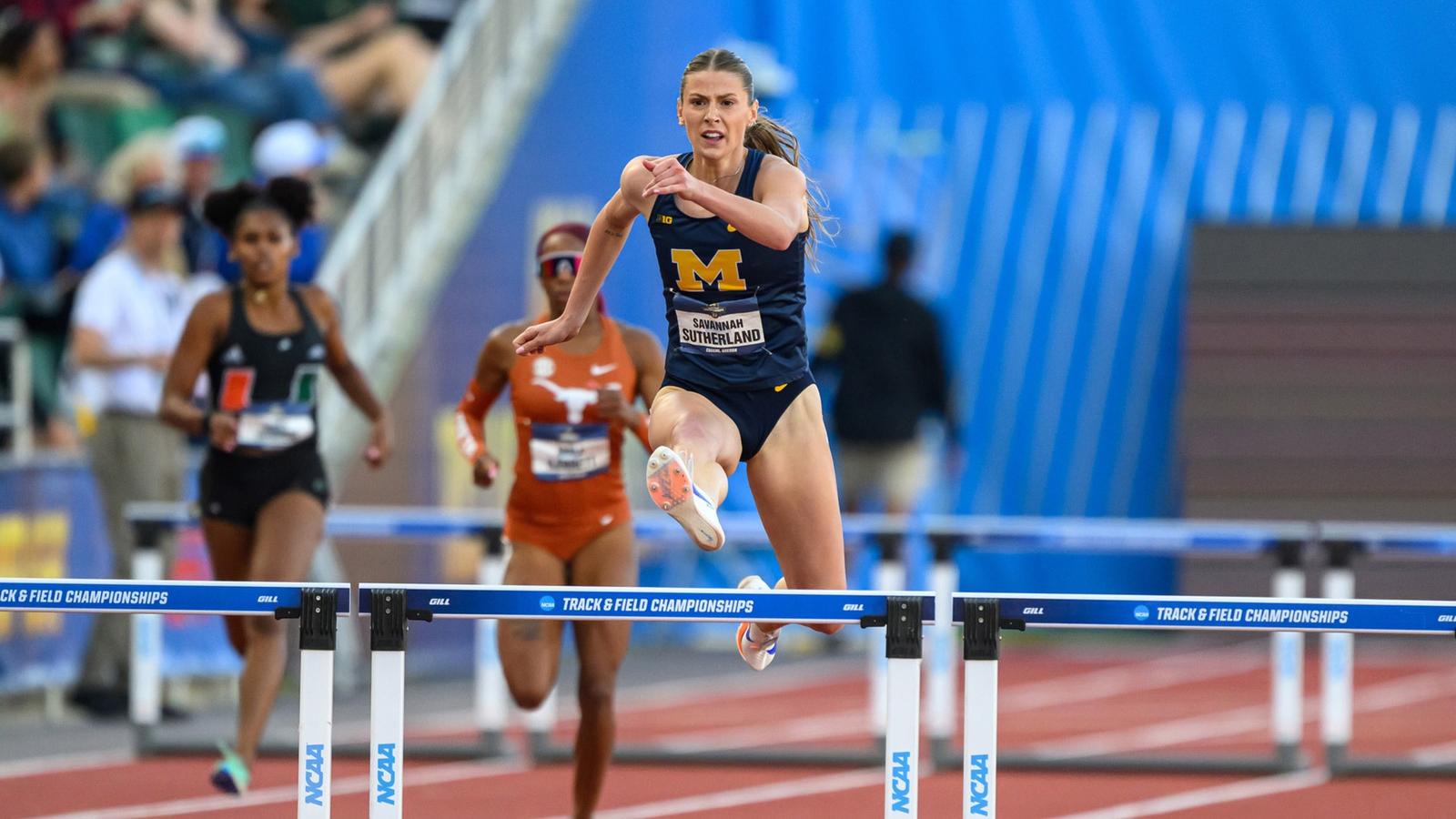
NEW ORLEANS, La. — Savannah Sutherland of the University of Michigan women’s track and field team has been named one of three finalists for The Bowerman, as announced by the United States Track and Field and Cross Country Coaches Association on Monday (July 7).
The Bowerman is bestowed upon collegiate track and field’s top male and female athletes for the year. Pamela Kosgei of New Mexico and Doris Lemngole of Alabama join Sutherland as the finalists for the award.
Sutherland was named to The Bowerman Watch List twice during the indoor season and is the first Wolverine in program history to be named a finalist for the award. She is also the first Big Ten women’s finalist.
Sutherland captured her second national title in the 400-meter hurdles and her third straight top-two finish at the NCAA Championships on June 14. She ran a personal-best 52.46 seconds to finish 2.20 seconds ahead of the second-place finisher and set five records — the NCAA record, the NCAA Championship meet record, the Big Ten record, the Michigan program record and Canadian national record. She earned first team All-America honors for her performance.
She is just the third Wolverine in program history to win multiple NCAA individual titles and was named the 2025 Big Ten Outdoor Track and Field Women’s Track Athlete of the Year, marking her third straight year earning the honor. Sutherland was also named USTFCCCA Women’s Track Athlete of Year for the outdoor season, the first time in program history a Michigan athlete has earned the honor.
The senior is now just the second runner in NCAA history to break 53 seconds, with Sydney McLaughlin-Levrone setting the previous collegiate record of 52.75 in 2018. The time ranks No. 9 in the world on the all-time performance list and is the third-fastest time in the world this season.
Sutherland also ran the second leg of the 4×400-meter relay at the NCAA Outdoor Championships, clocking 50.71 for the fastest second leg and second-fastest split of the race. The relay squad finished 19th overall with a time of 3:33.75 to earn All-America honorable mention.
The Borden, Saskatchewan, native capped an impressive career in her final season for the Maize and Blue, winning her third straight Big Ten title in the 400-meter hurdles before setting the NCAA East First Round meet record (54.39) for the second consecutive year. She also helped set the program record in the 4×400-meter relay twice this season and earned a third-place finish at the Big Ten Outdoor Championships.
In the indoor season, Sutherland set a Canadian and program record with her time of 51.23 in the 400-meter dash at the NCAA DI Indoor Championships, placing fourth for her highest career finish at the NCAA Indoor Championships. She won the Big Ten 400-meter indoor title for the second straight year on March 1 after setting the program 200-meter record (23.26).
Sutherland was named Athlete of the Year for the Great Lakes Region after both the indoor and outdoor seasons.
She also represented Canada at the 2024 Paris Olympics, finishing seventh (53.88) in the 400-meter hurdle finals to become the first Canadian to reach the event finals since 1996, and finished sixth in the 4×400-meter relay (3:22.01).
Online voting for The Bowerman opens on Tuesday, July 8, at 4 p.m., and closes Thursday, July 10, at 2 p.m. The Bowerman 2025 winner will be announced on Dec. 18 at the Bowerman Presentation in Grapevine, Texas.
• Bowerman Release
Sports
Liberty Volleyball Adds Transfers Collins, Richardson
Liberty volleyball first-year head coach Jeremy White and his staff have announced the addition of Layla Collins and Shyia Richardson to the team’s 2025 roster. Collins comes from Virginia Tech, while Richardson will transfer from Louisiana. These two players join an incoming class which also features transfers Zoe Hall (TCU) and Molly Littlefield (Gardner-Webb) along […]
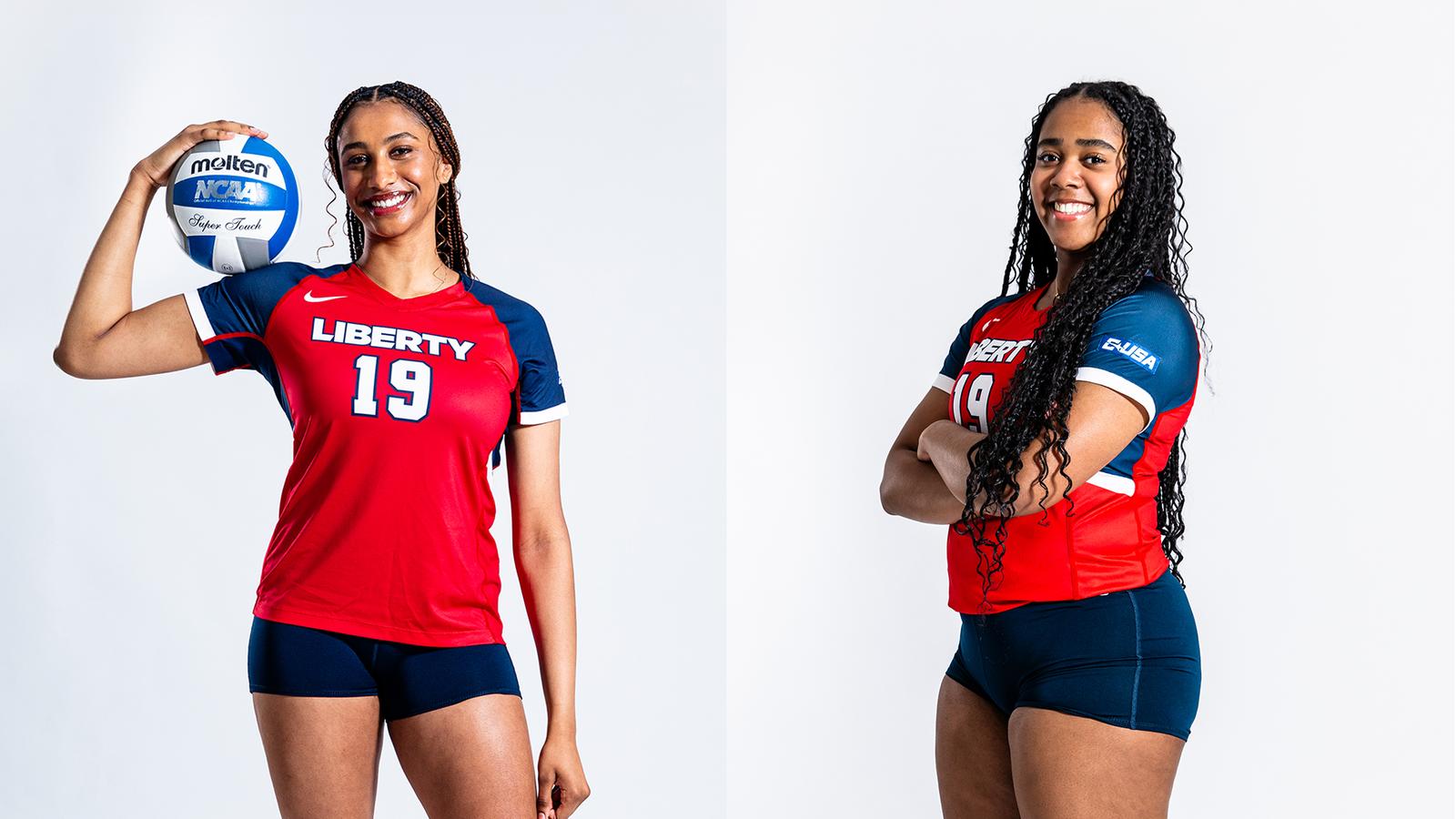
Layla Collins (MB, 6-2, Plainfield, Ill./Plainfield High School (Virginia Tech))
Layla Collins joins the Lady Flames after playing middle blocker for Virginia Tech as a freshman. She played in two matches during the 2024 season, recording one block and one kill at Wake Forest. A four-year letterwinner at Plainfield Central High School, she was the ranked in the top 100 for Illinois in the Class of 2024. As a senior, she was named Team MVP while receiving all-conference honors.
Shyia Richardson (OH, 5-10, League City, Texas/Clear Springs High School (Louisiana))
Shyia Richardson transfers to Liberty from Louisiana, where she had a standout 2023 season before missing the 2024 campaign. Richardson was named to the All-Louisiana second team in 2023, leading Louisiana with 380 kills, including 187 in Sun Belt play. She scored 15 or more kills seven times in Sun Belt play as a junior, including a career-high tying 21 kills against Texas State. Richardson played two seasons at San Francisco (2021-22) prior to her transfer to Louisiana, totaling 462 kills for the Dons. For her collegiate career as a whole, Richardson has recorded 852 kills and 580 digs.
-

 College Sports2 weeks ago
College Sports2 weeks agoWAC to Rebrand to UAC, Add Five New Members in 2026
-

 Motorsports1 week ago
Motorsports1 week agoWhy Cosmetics are Making Up for Lost Time in Women’s Sports
-

 Professional Sports2 weeks ago
Professional Sports2 weeks agoAlex Pereira responds to rumors of UFC heavyweight title fight with threatening message
-
College Sports2 weeks ago
Women's Basketball Thanks Shannon LeBeauf for 14 Seasons
-

 College Sports2 weeks ago
College Sports2 weeks agoAlabama Basketball
-

 Professional Sports2 weeks ago
Professional Sports2 weeks agoFrancis Ngannou sends Dana White a message following Jon Jones' shock UFC retirement
-

 Motorsports2 weeks ago
Motorsports2 weeks agoNASCAR This Week – Patriot Publishing LLC
-

 Technology2 weeks ago
Technology2 weeks agoPet fitness and wellness trends for a healthier and happier dog
-

 Health3 weeks ago
Health3 weeks agoSpeakers continue to weigh in on transgender athlete debate at District 203 board meeting
-

 Motorsports2 weeks ago
Motorsports2 weeks agoNASCAR‘s Countersuit Against 23XI, Front Row Motorsports Advances




















